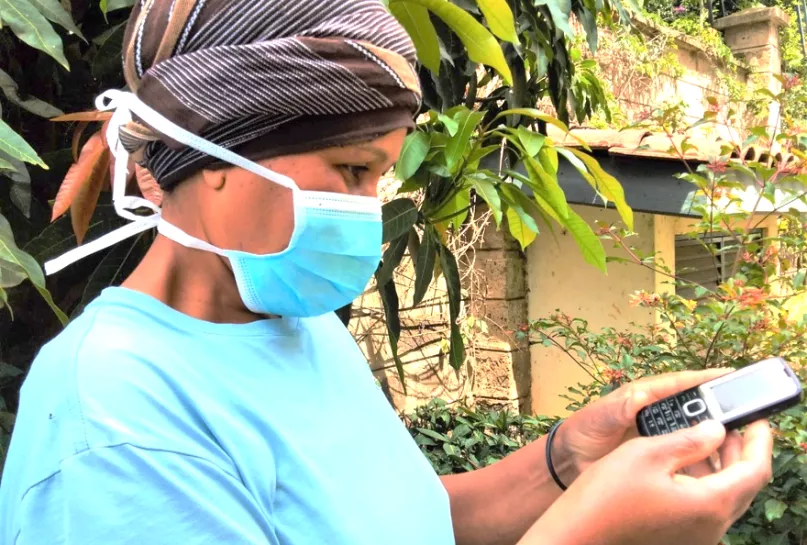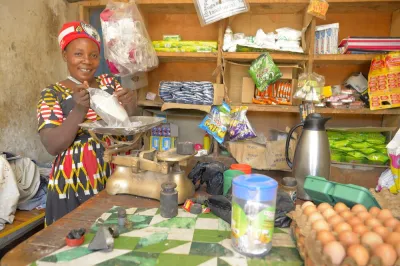Alternative Delivery Channels Can Help Financial Service Providers and Customers Navigate the Pandemic

In an effort to continue providing access to financial services during the COVID-19 crisis, more banks, retailers, consumers and governments are opting for cashless transactions. Alternative Delivery Channels (ADCs)—which include agents, mobile money, ATMs, electronic banking, mobile banking, cards and call centers—have the advantage of limiting disease exposure from handling cash and visiting crowded banking halls. In Sub-Saharan African markets where such ADCs were already well developed, financial service providers (FSPs) are leveraging them to meet customers’ needs for reliable remote channels that can seamlessly deliver financial services during the pandemic.
Prior to the outbreak, ADCs were steadily growing worldwide. A 2018 study by MIX found that, globally, over 60 percent of FSPs were serving clients through ADCs to improve customer experience and business efficiency. Whereas ADCs have been mostly used as secondary channels for convenience, the current crisis is underscoring the value of these channels, as well as the need for national infrastructure to support a major uptick in digital transactions. The coronavirus pandemic appears to have tipped the scales on demand for and uptake of ADCs. Most stakeholders predict that this shift will persist and define the inclusive finance sector even after the crisis subsides.
How are alternative delivery channels being used in African markets?
Financial service continuity is critical to coping with the current crisis and its economic fallout—for both customers and the FSPs that serve them. Given the high potential of ADCs and the current surge in their use, Ayani Inclusive Financial Sector Consultants is tracking their evolution in African markets to identify and address obstacles, as well as highlight approaches to bolster their successful application. We reached out to partners in Kenya, Cameroon and Uganda for a report.
Kenya
An early adopter of ADCs, Kenya is proactively facilitating access to ADCs during the pandemic. At the onset of the crisis, the Government of Kenya liaised with FSPs to advocate for cashless transactions and negotiate incentives to promote their use. Incentives have included doubling mobile money transaction limits and waiving person-to-person transaction fees. Since then, push and pull (account-to-wallet) transactions have significantly increased and continue to be the most frequent transaction type among banked customers.
On the other hand, many agents are reporting increased cash-out even in typical cash-in areas, alongside a general decline in business due to movement restrictions and night curfew. Liquidity management is becoming difficult, and as a result some agents are re-directing their funds into their other businesses, such as retail shops.
Cameroon
Cameroon has a less developed ADC market, with thin ATM coverage and only two MNOs offering mobile money. Since the onset of COVID-19, however, demand for and use of mobile money and agent banking are increasing, especially among low-income earners and despite long-standing trust issues arising from past incidences of fraud. Agents whose outlets double as grocery stores, fuel stations, pharmacies and supermarkets are preferred. Transaction limits remain the same, though, necessitating multiple visits to touchpoints for cash-out.
Uganda
The COVID-19 lockdown in Uganda is also stimulating demand for and innovation in ADCs. Since most FSPs have closed their city center branches and reduced opening hours, customers are increasingly turning to electronic bill payments and mobile money. An informal e-commerce delivery service has rapidly emerged, combining digital payments with motorbike deliveries. Demand for agency banking, which had already gained strong traction in the country over the past two years, has increased over the past month.
However, agents in Uganda are also experiencing difficulties. Many agents are attempting to manage uneven liquidity by exchanging e-value amongst themselves. Declines in agent commissions and transactions have led a number of agents to liquidate their e-value and divert it to other uses. Given the economic downturn, these agents may be slow or unable to return to their agent banking business in the future. This presents an opportunity for FSPs to develop agent-tailored products to assist them with resumption of business.
Leveraging the potential of ADCs to navigate the crisis
What can FSPs, donors and other stakeholders do to leverage the potential of ADCs to successfully navigate the crisis? We have identified three key actions for moving forward.
1. Develop digital capabilities. For FSPs without ADCs and those with partial offerings, the coronavirus crisis is demonstrating the significance of developing robust digital capabilities to protect business continuity and retain customers. While the circumstances and urgency may make corner-cutting more attractive, ADC implementation needs to be complemented by FSP-level digital transformation to set a solid foundation.
A majority of those African FSPs still lacking ADCs cite insufficient funds and expertise to transform internal systems and invest in product development. This gap presents an opportunity for donors and development organizations to de-risk these investments and provide technical support that can help FSPs fulfill the promise of ADCs.
2. Enhance customer education and awareness. During this time of upheaval, proactive customer communication is crucial—whether sharing information on FSPs’ management of the crisis, the benefits of digital options, fraud prevention or issue resolution channels. Many African FSPs are keeping their customers engaged, informed and reassured through targeted digital communication via SMS, WhatsApp, social media and call centers. The FSPs interviewed reported an estimated 200 to 400 percent increase in customer queries via call centers, SMS and Whatsapp since COVID-19 hit the continent.
3. Reinforce data privacy and information security. Increased use of digital channels invariably multiplies the risk of fraud, targeting both customers and FSPs. Incidences of fraudulent SIM replacements, phishing and data breaches have been reported. To address this risk, it is important that FSPs take measures to:
- Ensure data privacy.
- Seal loopholes that can lead to data loss.
- More stringently manage data generated by third party service providers.
- Intensify customer awareness.
- Institute effective issue-handling mechanisms.
- Engage law enforcement.
The COVID-19 pandemic will have far-reaching implications. Amid the uncertainty, it is evident that the long-term winners will be FSPs that invest in strengthening their ADC channels. The resulting spark in ADC investment may be a silver lining of this crisis that serves to enhance financial inclusion both during and well beyond the pandemic.



The goal is to improve customer service relationships and assist in customer retention and CRM systems compile customer data across different channels. Now, regulatory infrastructure offers non-financial businesses easy and convenient conditions for companies of all sizes to navigate.
Leave a comment